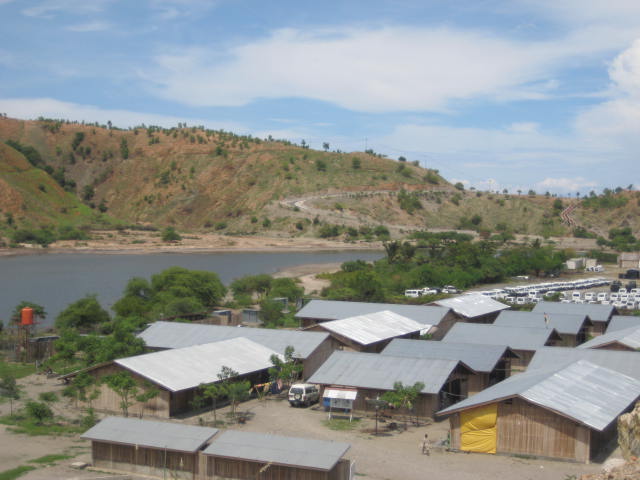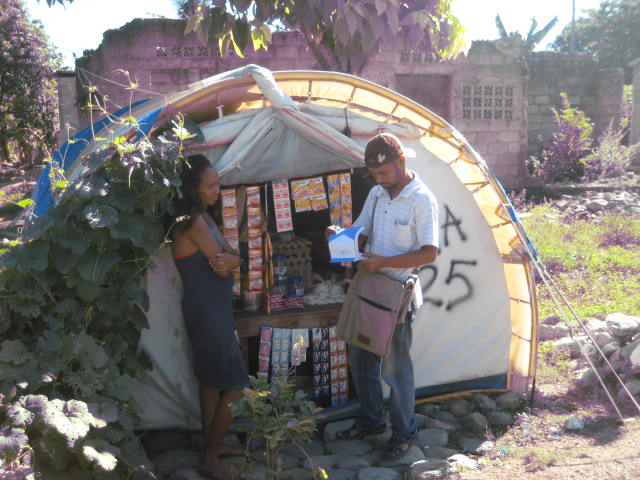Walking around Dili city, one can no longer see the IDP camps. But for those who lost their homes during the crises of 2006 and 2007, their wait for “safe return and reintegration” is far from over.
Though reintegration of the IDPs into their communities started since 2008, there are still around three thousand people living in transitional houses. They are not able to return to their original homes for several reasons: concerns regarding their security, ongoing land disputes over ownership, illegal occupation of their houses, and some don’t have any place to stay.
The Timorese Government, along with the Norwegian Refugee Council (NRC), has built transitional houses in six areas. Four are in Dili city and two outside the city in Tibar and Hera. Each house is occupied by four to eight families. The government through its Ministry of Social Solidarity (MSS) has mentioned that this is a temporary measure and that permanent houses will be built in new places. However, it is not clear as to when this policy will be implemented.
According to the NRC which manages the camp, a total of around 2,072 persons are staying in temporary houses in the four areas in Dili City. As per the information gathered from these people, they face different problems. Around 50% are totally homeless (these people never had any houses); 39% have security problem or concerns, and because of these, they don’t want go back to their home base); and 11% have their houses occupied by others people or are facing others difficulties.
 |
| Transitional houses in Tasi Tolu. |
Elvira, an IDP from Saint Joseph College camp and now staying at the temporary house in Becora market, informed JRS, “I cannot return to my home because my brother and his wife have already occupied the house. I have no choice but to stay in the temporary house with my ten brothers and sisters.” She is not sure when she can return home with the entire family or if she can return at all.
Eight families from JRS supported 6 IDP camps are unable to return to their home. They continue to stay in the transitional houses because the host community and the local authorities of their home base are not willing to accept them back. Most of the people in the host community think that these eight families were involved in criminal acts. But so far there is no evidence that shows they were involved. The local security authorities are not paying attention and not investigating properly.
JRS is trying to find a mutually acceptable and durable solution including conducting mediation between the conflicting parties along with its partners (IOM, CRS, Catholic Church and MSS). JRS is also in contact with local authorities to resolve the problems, but so far it is still difficult to find the solution. Several mediation meetings have taken place where these two parties, the host community and the eight families, participated. Through several dialogues and mediation meetings, it was determined that the local authorities are part of the problem. An apathetic police force and insensitive justice system further make it more difficult for organizations to help these families go back to their home base.
Difficulties in rebuilding lives
 |
| Ms. Modesta Ero Faik with JRS monitoring staff. |
Ms. Modesta Ero Faik, a 39-year old widow and mother of a 4-year old son, is still living in a tent. She came from Suai District in 1991 and lived in Santa Cruz Village in Dili. The place was given to her by Mr. Leonildo de Carvalho, the land owner, because he sees her as his daughter. She built a small house, where she also opened a kiosk. During the 2006 crisis, she, with her son, sought refuge in Motael Church camp on the 26th of May. Her house, including the kiosk, was burned. On 19th December 2008, she came back but the land owner would not let her to build a house again. She was only allowed to put up a tent while looking for another place. She received government recuperation pocket money (USD4,500) but the amount is not enough to buy land and build a new house.
Pendent barriers after closing the camps
Mariano Ximenes (of Moris Foun Sub-Village) who was staying in Don Bosco camp complained to the local authorities that one Umberto de Jesus occupied his old house after getting it reconstructed. Though he had approached Umberto to vacate his house but he refused.
 |
| Mediation organized by JRS & CRS to facilitate dialogue. |
The local authorities, unable to solve the issue, invited JRS to mediate in partnership with CRS and government representatives.
During the mediation, Umberto expressed his point of view, “I had rehabilitated this house with $1,500 during 2007, when Mariano moved to the IDP camp. I am ready to leave the house, but Mariano must repay my money that I used for rehabilitation”.
After days and hours of discussions, Mariano Ximenes stated, “I agree to repay Umberto, but only $500 plus the needed materials for building his house in another place.” Thus, a written agreement was made between the two parties and Ximenes was able to get his house back.
Cristina da Costa “I am upset, no one is looking after our needs”
 |
| Cristina with two of her children. |
Cristina da Costa is 63 years old with two young children suffering from mental-deficiency and one normal daughter.
Her daughter Filipa, is normal. Her son Elias, 17 years old, suffers from epilepsy since his birth, and her second daughter Laura, 15 years old, is deficient of one arm and cannot move it around.
Their father Armando Mendonca is un-employed and everyday just helps other people to get money. Cristina stays at home everyday to look after their three children. She does not have much energy to work to sustain her children. When the conflict between the various martial art groups happened in 2007, Armando Mendonca and his family moved to the IDP’s camp in Canosa Balide.
Before their return, the family got recuperation pocket money of about $200 and 50 kgs of rice. Cristina’s normal daughter, Filipa said “The money that we got from the government is not enough to sustain our family. I have responsibility to look after our family every day. I sell small cakes, vegetables in the streets”.
Mrs. Cristina said, “Every day I have to clean both Elias and Laura, help them both to wear their clothes, assist them go to toilet. Many kids don’t want to play together with Elias and Laura because of their physical deficiency. I am very sad. However deficient they are, but they are still human beings. When I returned from IDP’s camp, I was really sad, because there is no one to look after us. I always sit alone and think – when will this suffering will end. My husband is drunk every day and sometimes if he gets money, he buys food for his family. I am old now and I have 2 deficient children. What will happen to them after I am gone? Who will look after them?”
Now, Armando is 86 years old and Cristina is 63 years old. Though they both are aged, no one in the government is paying attention to them, including national and international agencies that should be supporting elder people’s rights.
(Contributor: Isidoro V. da Costa,Project Director – JRS Timor Leste, Email: jrstls@gmail.com)






